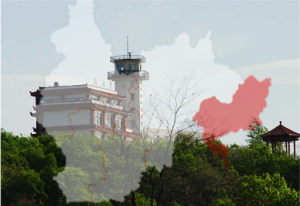The establishment of the Hunchun Border Economic Cooperation Zone (ECZ) is not news and already has a long history; however, the development of this project always attracts certian interest. Here the economies of virtually all countries in Northeast Asia are interwoven: China, Japan, South Korea, the DPRK, and the Russian Federation. The Hunchun project interests Mongolia as well, which is landlocked.
The Chinese Government and the leaders of the Jilin province initiated the establishment of the ECZ. Four sectors are planned to operate in the zone: the PRC-DPRK sector, the PRC-RF sector, etc.
According to decisions by the National People’s Congress of the PRC, the ECZ enjoys financial, customs and tax benefits, benefits in distribution of the manufacturing sector and investments, in use of land, in the construction of infrastructure, etc. Experts believe that the ECZ will become a powerful transportation, trade and logistics center in international trade in Northeast Asia.
Of particular interest to China is the forward-looking transit port Zarubino located in Troitsa bay (Russian Federation). It allows the Northern provinces of the PRC to substantially accelerate delivery of goods to Japan. According to Hunchun Mayor Cui Jin, use of the port Zarubino reduces transport time of packages from China directly to Japan several times over. From Hunchun to Zarubino is only 70 km.
The port has a vast territory, a large cargo area, and 840 meters of quay wall. All of this creates the conditions for high-speed processing of goods, and excludes the possibility they will sit idle. If one is to develop a transport chain in China, the nearest port, Dalian, is by car almost one thousand kilometers away. Dalian itself is very overloaded, and moving packages could take two days or a month. No one is interested in waiting that long.
Development of import-export trade through Zarubino creates a significant basis on which to develop the ECZ. And the port authority and the government of the Chinese province of Jilin have one goal — to increase traffic on the route through quality service.
One of the main advantages of the Zarubino port is its railway connection: from the Transsiberian through Ussuriysk, from the PRC (Hunchun) through Kraskino and the DPRK through Hasan. As is well known, recently, as part of the reconstruction of the Russian Railway’s Trans-Korean line, the Hassan – Rason (DPRK) railway was restored. The Rason port can generally accommodate the transshipment of bulk cargo (especially coal); however, the construction of a container terminal here is planned in the near future that can accommodate 400,000 twenty-foot equivalent units (TEUs), a standard-size container, a year.
The Rason port, according to the agency Vostok-Media, has good prospects to become a reliable platform for cooperation of the Russian Railway with North and South Korea. Rason is notable for its advantageous location: it is located in a bay which is closed-off from the sea by islands that provide security of goods. Natural depth on the approach to the port reaches 20 meters; that allows it to take on a heavy-duty deadweight cargo capacity of up to 12,000 tons. Navigation can be done in winter as well; the port will not freeze.
The Chinese and Korean business community is pleased with the launch of movement along the Trans-Korean line. Businesspeople believe they will be able to send their products on this route to Europe faster than by sea. As commentator Anastasia Barannikova asserts, if transportation of a standard 20-foot container from Busan in South Korea to Moscow by sea costs $1232, shipping the container by rail through Pyongyang (DPRK) and on the Trans-siberian line will cost $889. Another advantage of the land route is speed. Today crossing the distance from Asia to Europe by sea takes 35-40 days. The railway line allows delivery of goods in only 17-20 days. Shipping a freight container from South Korea to Finland takes about 14-16 days, which is significantly less than 40-45 days carriage over the Suez Canal and Gibraltar.
What’s in store for Zarubino?
A survey by the secretariat of the Extended Tumangan Initiative (Beijing) in 2010 of potential users of the port allows us to make the following prediction. By 2030, at 100% capacity, the port could be trasshipping 90-100 million tons of cargo, including containers (6.5-7.0 million TEU).
Today the situation is this: the group “Summa”, the main shareholder of the company FESCO, agreed with three Chinese companies on the transshipment of goods to the Zarubino port, still under construction, to Primorye. They are a Jilin Province grain company (10 million tons), the company “Henda,” (on the transshipment of 5 million tons of water with possible growth in the volume to 40 million tons by 2025), and a Volkswagen assembly plant, the Chanchun automobile factory on the import of up to 1 million cars and 40 thousand TEU of car parts a year.
Head of port construction Andrey Zagorsky claims that contracts for the transshipment of 80 million tons of cargo per year have already been sealed.
North-Chinese companies are particularly interested in expanding Zarubino’s opportunities, which, in addition to exports, intend to transship their goods through the port to China’s southern provinces as well.
By 2018, four terminals should be completed and operational in Troitsa bay (Vladivostok): grain, container, general and bulk cargo, as well as means of transport. The total cost of the project was estimated in May of this year at 40 billion rubles. “Summa” will build a large part of the port at their own expense. The investment amount in the future could significantly increase, as volumes which Chinese companies were ready to transship in the initial period of the project’s development are a much larger currently.
In the future, based on Zarubino port, a center of transit traffic can be created between the countries of the Asian Pacific and the EU for a wide range of goods: containers, automobiles, and general cargo.
Konstantin Penzev, historian and writer, commentator for the online magazine “New Eastern Outlook”.

